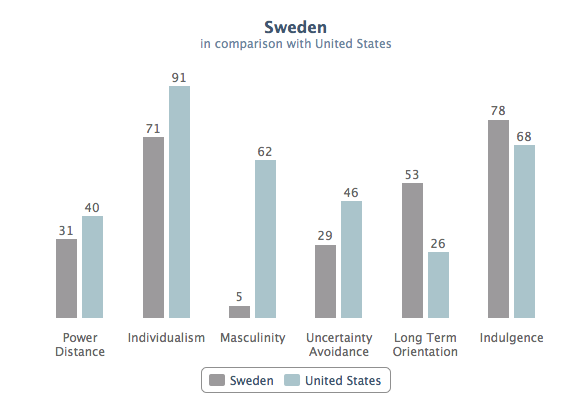
Americans are great speakers but rarely listen well. As a result, doing cross-border business in a different cultural environment like Sweden can be challenging. Training yourself to become a better listener and hiring a cross-border consultant are the keys to successful communication.
While giving a speech in Minnesota several weeks ago, I met the marketing team of a Swedish company who were eager to share their cross-border communication issues with me. Their concerns highlighted several interesting aspects that I want to share today.
As an experienced cross-border consultant, I love to share my knowledge of American, French, and German business. But to understand the American-Swedish relationship, I had to listen carefully and to do additional research. This task was not too difficult, thanks to my Swedish brother-in-law and my business partners who are used to working with Swedish companies.
The cross-border communication issue
My counterpart is the Vice President of Marketing of the American office with extensive field experience. He has worked with this company for seven years where he is responsible for Global Marketing. He is aware that he and his team have a communication problem with their Swedish colleagues. He feels also that the way Americans conduct business may be the source of the problem. My counterpart describes himself and his co-workers as task-orientated, searching for improvement and better performance. At the moment, his team finds working with Swedish colleagues to be frustrating. Their ideas were not considered, and attempts to address the problem have not facilitated success yet.
Because many Swedish people are fluent in English, language is not likely the problem in this cross-border communication predicament. Furthermore, the company management in Sweden chose to hire Americans for marketing, which suggests that they acknowledge Americans have a higher level of expertise in this field than Swedes.
However, my counterpart has discovered that neither he nor his Swedish colleagues understand each other. This situation is not surprising. Business professionals can hardly be expected to become proficient in every language and culture. Often, we see people without appreciating the formative power of their culture behind them. In addition, until now there has been no standardized way to translate behavior from one culture to another.
Sweden ranks high in teamwork
After returning to Washington D.C., I talked to a French engineer, who had worked in Sweden for five years as a Project Manager for Nestlé. After college, he worked in France before relocating to Sweden, the United States, and the Netherlands. He now works for an international organization in Washington D.C.
When relating his experience in Sweden, he stated: “At the beginning, I often missed the point when the group took a decision during a meeting. I had to train myself to listen even more carefully. After a while, I got better because I figured out that decisions were not made from top to bottom, but by considering the whole group. It is really about teamwork in Sweden. It is not about a person but about a group.”
He added that for Swedish professionals “To be the boss doesn’t mean to give instructions, but to manage a team so that the project will be well done. That means to spend more time to share views and to reach an agreement. It is not about pushing ideas but to perform for the company’s purpose. Swedish people don’t like to speak loud. They prefer to listen and to think before giving an answer.”
Culture clash
Swedish professionals are more relationship-oriented than achievement-focused. This explains the subtle cultural tension described initially. Scandinavian cultures like Sweden, Denmark, or the Netherlands focus more on values like consensus, compromise, and negotiation. Americans and other generally Anglo-Saxon countries are more direct in business, which can be misunderstood as aggression. Please note that when I am referring to Americans, I am characterizing the predominant group in modern American business.
In the words of my Vice-President counterpart: “Last year, during the annual meeting, I wanted to promote our ideas and to force some decisions. Unfortunately, my colleagues in Sweden were more interested in partying than meetings. I am now at a point where I don’t know what to do in order to perform better in my job. I have extensive experience in the American market that I would like to share. On the other hand, our competitors are moving forward and we really need to react. Unfortunately, my Swedish colleagues don’t listen to me.”
Learn more about cross-border communication with Hofstede
When working with a new client, I often refer to Geert Hofstede, a Dutch social psychologist. Hofstede is known for his research on cross-cultural behaviors and for developing a theory of cultural dimensions. His research visualizes different cultural values via indexes. This system offers an explanation of where challenges in cross-border communication may come from.
Here is a screenshot from Hofstede’s website comparing cultural preferences between Sweden and the United States. If you want to know more, please see Hofstede’s website here and use the countries comparison tool.

According to Hofstede, the biggest difference between Americans and Swedes relates to their perceptions of achievement, termed “Masculinity” by Hofstede. In his book Cultures and Organizations: Software of the Mind, Hofstede states that “In the United States . . . there is a feeling that conflicts should be resolved by a good fight . . . In feminine cultures such as . . . Sweden . . . there is a preference for resolving conflicts by compromise and negotiation.”
Remember what the French engineer and my American counterpart said. On one hand, an American manager wants to talk about work objectives and performance improvement. On the other hand, according to the Americans, Swedish people may “prefer to party.” Listen again to Hofstede about relationship-orientated culture like Sweden: “People work in order to live.” Task-orientated culture like the United States are more likely to follow this statement instead: “People live in order to work.”
Intercultural interaction and coaching are recommended
In an earlier blog post, I stated that cross-border marketing is about culture. The problem we just explored excellently illustrates this principle. Back to my American marketing team in Minnesota: improving their performance is possible if they adapt their communication style and become better listeners. Their ideas will likely receive greater consideration as their cultural awareness and communication adjustments improve, even if initially the American team may have the impression that their ideas are not considered because of the Swedish mode of conducting business.
Hiring a coach or cross-border consultant is also a smart means of improving communication. This person should be able to translate not only words, but also non-verbal communication as well. For example, Swedish people rarely rely on body language. Instead, listening is key for them. I am a big fan of Americans who are great speakers. But in this cross-border marketing case, listening is the key!
By the way, this is my first blog post in English. I usually write in French or German and translate my posts via two excellent translators on Elance.com. For this post, I composed the content as usual, but also hired a native editor to polish the final post. I hope that you enjoyed this article. Please feel free to leave a comment or a question below.
You might also be interested in reading these articles:
Navigating the minefield of work-life balance for American-Swedish business
or Work-Life-Balance in the United States
Photo credit: © TR





Merci de ce message si intéressant.
Le développement de ton blog m’inspire, une idée qui me vient a l’esprit est : comment une différence (de taille) sur une seule dimension (en l’occurrence la dimension Mas/Fem) met des différences culturelles autant en évidence ? Il ne s’agit pas de détails.
G.Hofstede a fait un développement similaire entre l’Allemagne et le Royaume-Uni, dont l’étude des dimensions diffère pour l’essentiel sur le contrôle de l’incertitude.
A nice article, Catherine. Which just reminds me of the danger of stereotypes. Somebody who is not a good listener and interpreter and reads an article like this quickly and superficially, may conclude that “Americans work hard” and “Swedes like to party”. A completely wrong picture of the working standards in Sweden. Fortunately the world is not black and white, but full of nuance. The Swedes – at least most of them, but we cannot generalize – value the work-life-balance very much. There is time for work, and there is time for family and time off. I have experienced the Swedes however as very determined, thoughtful and precise at work: the quality of the end result is highly valued. For party there is little time in the office; they generally are serious, task-focused and un-emotional.
I like working with the thoughtful and nice Swedes. I like working with the determined and action-oriented Americans.
And hiring a cross-cultural consultant can be only a little step in working more effectively with other cultures. Looking in the mirror is step one for me: becoming aware of how you come across to others yourself. Step 2 then is increased understanding of other cultures. Hofstede can help, but is certainly not the “bible of wisdom”; some Hofstede scores are hard to generalize for a country or even region, and time has an effect too: the China scores of 1970 cannot be extrapolated to have meaning for a start-up in Shanghai these days.
Good point Frank, I will certainly point out in another blog post the differences between Work-Life-Balance in Sweden and the US. Thank you for your comment.
Thanks for the tips included in your blog post. i went onto Hofstede website and did the culture test. Results are quite interesting and revealing, i think.
Also and to give you credit for a good insight, it is true I’m fascinated by the interplay of culture and work.
You’re welcome Nathalie!
Well put, and right to the point, Catherine!
Louis
You’re welcome Louis!